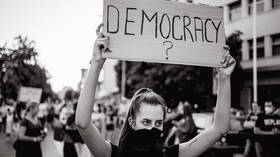Democracy isn’t working for young people because cancel culture has made them scared of freedom of speech

A new report suggests more and more people are dissatisfied with democracy. This may be true, but its failure to blame the rise of identity politics and cancel culture for this trend is a glaring omission.
A report published by the Centre for the Future of Democracy at Cambridge University on global satisfaction with democracy makes for worrying reading. It indicates that dissatisfaction with democracy is at an all-time high throughout the world.
What is of even more concern is that millennials are particularly turned off by democracy, and are more disillusioned with their system of government than any other young generation in recent times. Only a minority of British millennials – 48 percent – say they are satisfied with the workings of democracy.
The report claims that the disconnection of millennials from their institutions is particularly striking in the United States and Great Britain. Although this study is right to point to young people’s loss of enthusiasm for democracy in Anglo-American societies, the explanation it puts forward to account for this phenomenon is flawed.
Dr. Roberto Foa, lead author of the study, insists that what he calls the ‘democratic disconnect’ among the young is due to the failure of Anglo-American societies to deliver economic benefits for them. According to Foa, the disillusionment of the young constitutes a response to their governments’ inability to address inequality and climate change.
There are a number of flaws with Foa’s argument. In principle, young people demanding greater opportunities and greater equality are just as likely to embrace a robust democratic strategy for change as to reject it. Whether or not society takes democracy seriously does not simply depend on attitudes towards economic matters, but mainly on the value it attaches to democracy.
As I argue in my soon to be published book, Democracy Under Siege, a growing body of elite opinion has become disenchanted with the capacity of the people to make democracy work effectively. That these sentiments are particularly notable in the Anglo-American sphere is not surprising, since it is in these societies that the cultural values of freedom and democracy have been most subjected to constant questioning.
One of the distinguishing features of the Anglo-American world is the important influence exercised by identity politics and cancel culture. Identity politics is profoundly hostile to democratic decision making and prefers its different identity bubbles to a public life that involves citizens as a whole.
Also on rt.com Cancel culture invited to PlayStation: Sony enables RECORDING of game chats & lets players TATTLE on each other for hate speechPublic life, which is intimately linked to debate and argument, is often framed in a negative light by identarians.
Consequently, contemporary political culture has become estranged from the democratic tradition of open debate. The scale of this problem was brought home to me two years ago by a survey published by the Harvard Crimson, the university’s student newspaper. It indicated that a significant portion of the 2018 graduating class was self-censoring their opinions and not debating in public. According to the report, around two-thirds of students who were surveyed had “at some point chosen not to express an opinion in an academic setting out of fear that it would offend others.” The survey indicated that 78 percent of registered Republicans said they “withheld opinions in class,” compared to 59 percent of registered Democrats and 73 percent of registered Independents.
That graduates of this most prestigious university were so readily prepared to self-censor and not voice an opinion indicates that – if not in theory, but certainly in practice – they were not prepared to take the values underpinning democracy seriously.
The foundational value on which democracy flourishes is freedom, and in particular the freedom to voice an opinion. One of the accomplishments of identity politics has been to devalue the appeal of freedom, particularly among the young. Free speech, which is the lifeblood of democracy, is constantly called into question by advocates of cancel culture. No wonder so many young people regard democracy as not a big deal.
In reality, the Centre for the Future of Democracy’s report overlooks the most important driver of young people’s disconnect from democracy. This 60-page report does not have a single reference to identity politics and reads as if its influence in education and popular culture does not exist. It deals with democracy as an abstract institution, and makes no attempt to understand how its foundational values have lost their appeal to many young people. Yet, sadly for the first time in the modern era, there are numerous examples of youngsters actually rebelling against the freedom of speech.
When so many young people unhesitatingly assert that ‘you can’t say that, it is offensive’, you know that democracy is in trouble.
Think your friends would be interested? Share this story!
The statements, views and opinions expressed in this column are solely those of the author and do not necessarily represent those of RT.

















